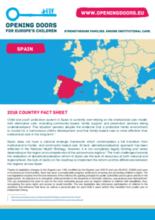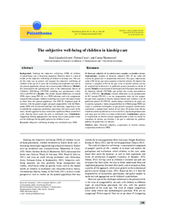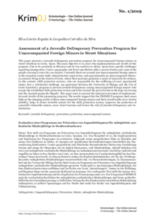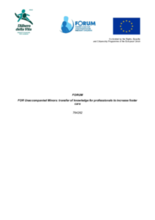Displaying 91 - 100 of 150
This factsheet highlights the developments and challenges still ahead in Spain and offers key recommendations to the EU and the national government to ensure that children are cared for in family-based settings.
The aim of this study was to analyse and compare the subjective well-being of children at the age of 12 years old in kinship and residential care and in the general population, taking into account gender differences.
The present study aimed to measure lifetime prevalence and frequency rates of child physical and emotional abuse, neglect, domestic violence, and several types of sexual and peer victimization among adolescents in residential care.
The aim of this study is to explore whether girls who are in residential care have fewer emotional skills than their peers, and if so, whether these girls have similar socio-emotional skills to girls who also experience disadvantaged environments but live with their families.
The aim of this study was to analyse subjectisuppleve well-being (SWB) among adolescents in care, considering the type of placement in greater depth and how it correlated with several explanatory variables.
The aim of this article is to analyse the specific factors which influence adoption breakdown by comparing cases of adoption breakdown which occurred prior to the onset of adolescence with those occurring after the beginning of this developmental stage.
"No one is sure about how many migrant children are living in Spain without their parents — and that's part of the problem," says this article from Voice of America.
This paper presents a juvenile delinquency prevention program for unaccompanied foreign minors in street situations in Ceuta, Spain. The main objective is to assess the implementation and results of this program.
This article is written as part of the FORUM project (FOR Unaccompanied Minors: transfer of knowledge for professionals to increase foster care), an EU funded project which sought to enhance the capacity of professionals to provide quality foster care for unaccompanied migrant children, primarily through the transfer of knowledge. The article aims to contribute to this transfer of knowledge by bringing together literature which is of relevance to professionals developing or enhancing foster care services for unaccompanied migrant children.
This study examined adopted adolescents’ levels of attachment security to parents and aggressiveness as compared to those of community nonadopted adolescents and of clinical nonadopted adolescents.




